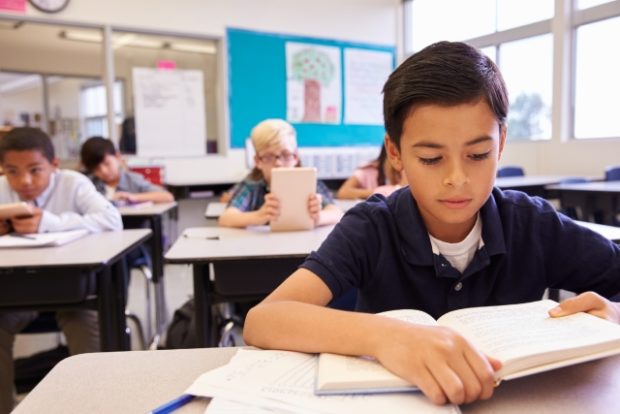
Student learning rates were estimated between the end of the 2019-2020 school year and the beginning of the 2020-2021 school year. Image: monkeybusinessimages / IStock via AFP Relaxnews.
What impact could last spring’s school closures have on the academic performance levels of schoolchildren in the United States? Researchers from the Northwest Evaluation Association studied the question in a recent report, which was published in the Educational Researcher journal last Oct. 28.
The researchers analyzed periods of interruption to learning —generally, the long summer recess — in relation to learning loss and how students catch up when they return to school. They used this as a basis to evaluate the potential educational impact of the COVID-19-related school closures seen in the U.S. and elsewhere.
Previous research has consistently shown that educational achievement typically slows or declines during the summer months. Such declines in performance can also be observed during school closures linked to weather events or natural disasters, although to a lesser extent, since these closures tend to be shorter.
School closures during the COVID-19 pandemic have almost certainly impacted children’s levels of academic achievement, particularly due to the blatant inequalities surrounding distance learning, the report noted. The research is based on the test results of almost five million students in grades 3 to 8 in 18,958 schools across the U.S. The data comes from the Northwest Evaluation Association (NWEA), a non-profit organization supporting students and educators.
Schoolchildren’s levels were estimated between the end of the 2019-2020 school year and the beginning of the 2020-2021 school year. According to their projections, the scientists consider that students probably started school this fall with around 63 to 68% of the learning gains in reading and with 37 to 50% of the learning gains in mathematics relative to a typical school year.
Learning loss appears to be greater in math than in reading, a difference that could be explained by greater focus on reading in educational programs during the summer or COVID-19 closures (recommendations to read and free book distribution, among others).
The researchers hoped that their projections will encourage educators and policymakers to take into account the fact that many schoolchildren are suffering significant learning loss due to prolonged school closures, especially if schools remain disrupted during the 2020-2021 academic year.
The authors concluded it is important to identify students who may have fallen behind and provide them with extra support. CC
RELATED STORIES:
Mental health of students, teachers a ‘big challenge’ amid pandemic — DepEd chief
Why push for classes when pandemic affects students’ mental health? — CEGP to DepEd, CHED